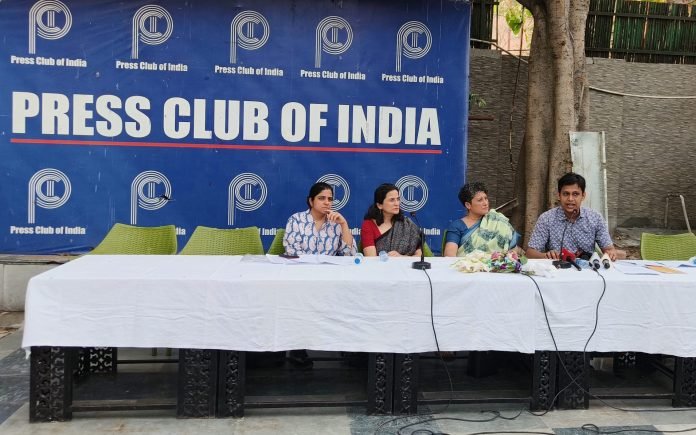
Journalists from across platforms gathered on the Press Club of India (PCI) lawns in Delhi on 21 April at an open meeting to express their concern over the Digital Personal Data Protection (DPDP) Act, which they said would deter journalists from doing their work in a free, fair, and smooth manner.
The discussions touched upon various aspects of collecting and utilizing information and data through Right To Information (RTI) or other means as well as dwelt on the lack of balance between RTI and the Right to Privacy.
The Digital Personal Data Protection (DPDP) Act, it may be mentioned, was enacted in August 2023 for the processing of digital personal data in a manner that recognizes both the right of individuals to protect their personal data and the need to process such personal data for lawful purposes. While the DPDP Act lays the broad foundation for data protection, the DPDP Rules, released on 3 January 2025, clarify the details, address the finer points, and operationalize the Act.
Experts say RTI empowers citizens to take a stand against corruption, abuse of power, and human rights violations. It is also a means through which journalists extract information about government schemes and many other happenings.
However, according to the Data Protection Board, accessing individual information is a violation of the Right to Privacy and so could stand directly in the way of a journalist’s work.
“Our biggest concern about the act is the penalty clause of a whopping Rs 250 crore, which can go up to Rs 500 crore, against an individual or entity if the DPDP Board that the government would appoint deems fit,” Gautam Lahiri, president of the Press Club of India, said in a statement.
In simple terms, if the board comes to the conclusion that a certain information a journalist may have attained through the RTI tool violates the Right to Privacy, it has the right to take action.
“The Digital Personal Data Protection Act 2023 could be the death of journalism as we know it. When Section 8(1)(j) was already in effect, was there any need for an Act that hinders the work of investigative journalists hoping to report the truth in any matter?” asked Anjali Bhardwaj, representing the National Campaign for People’s Right to Information (NCPRI).
Bhardwaj says the DPDP Act makes it difficult for journalists to use information gathered on their own or through anonymous sources to expose corruption or wrongdoing by any individual official.
Section 8(1)(j) of the RTI Act, 2005, deals with the exemption of personal information from disclosure. It allows for non-disclosure of information that relates to personal information, has no relationship to any public activity or interest, and would cause an unwarranted invasion of privacy unless the public authority is satisfied that the larger public interest justifies disclosure.
For instance, if a journalist wants to access information about the construction of a road and about the contractor who was hired to build it, he or she could be denied the information as it violates the privacy of the contractor. Something similar could happen if a journalist wants to know about a government official who floated the tender and for how much.
Bharadwaj said, “In such situations, lack of accountability makes one feel if the Act is protecting the individual by withholding information or enabling corruption on individual parameters.”
Apar Gupta, advocate and a Right To Privacy activist, said under the current DPDP Act, accessing any individual information without proper consent on how it is obtained or what purpose it serves, is ‘Data Fiduciary’ and can be a punishable offence if the requirements are not met.
“Journalists are most of the time on the field for reporting. While reporting an incident, they might refer to individuals or incidents that may have happened previously in a similar manner. The Act states that any publishable information will not refer to individuals if they have not consented for their name to be used and have been made clear the purpose of the information,” Gupta said.
A Data Fiduciary, under India’s DPDP Act, is an entity, including businesses and organizations, that determines the purpose and means of processing personal data. Essentially, they are responsible for collecting, storing, processing, and using an individual’s data, including name, address, phone number, and email. Data Fiduciaries must ensure that data is processed lawfully, with consent, and for legitimate purposes, while also safeguarding it and adhering to data protection standards.
Gupta says the Right to Privacy is a complementary right to all fundamental rights and does not operate only under the spectrum of liberty. “The DPDP Act is neither protecting our Right to Privacy nor our Right To Information. If news organizations need consent for every piece of information to be published, they are no longer news organizations and will be just another PR agency.”
He said when the Act was introduced, the central government was a contesting party rather than being a consenting party.
The meeting concluded with the conclusion that the government needs to proactively restrain itself from infringing on privacy and the urgency to make a law in which the right to privacy is safeguarded.
Considering the high amount of penalty for the violation and to help journalists continue their work with integrity, the PCI will send a joint memorandum of understanding (MoU) to the government, asking for clarification and better guidelines to balance information and privacy.
The joint meeting was organized by the Press Club of India, the Indian Women’s Press Corp (IWPC), the Editors Guild of India (EGI), the Delhi Journalists Union (DJU), and Digipub.
















